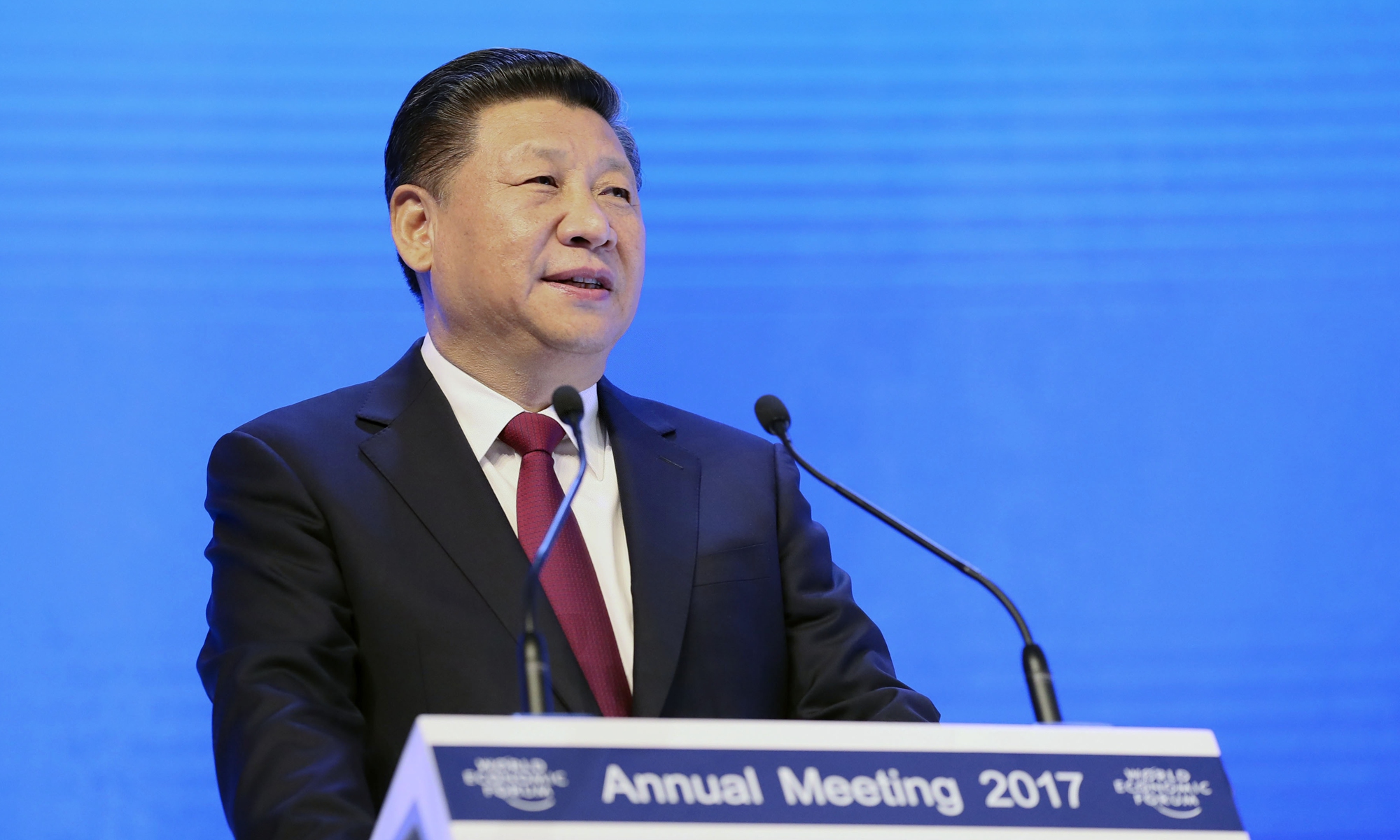
President Xi Jinping delivers a keynote speech at the opening plenary of the 2017 annual meeting of the World Economic Forum in Davos, Switzerland, Jan 17, 2017. Photo: Xinhua
Chinese President Xi Jinping will attend the Davos Agenda of the World Economic Forum (WEF) and deliver a speech via video link on January 25, the Chinese Foreign Ministry announced on Tuesday, marking the first major diplomatic event of the new year for the Chinese president at a critical time when the world remains engulfed in a COVID-19 pandemic and lasting disruptions to global cooperation from unilateralism orchestrated by the US.
Following an unprecedentedly challenging year in 2020 and latest economic indicators of China's robust recovery from the COVID-19, Xi's speech will likely focus on sharing the country's experience in the hard-fought anti-epidemic battle, calling for more global efforts in overcoming the unprecedented public health crisis while also reiterating China's continued commitment to an inclusive multilateral approach to address a wide range of pressing global issues, from epidemic control to economic recovery, Chinese analysts said.
The Davos Agenda 2021 will be held virtually from January 25 to 29 under the theme of a crucial year to rebuild trust, the Swiss-based WEF announced on Monday. Over 1,500 businesses, government and civil society leaders from more than 70 countries and regions will attend the online meeting, according to a press release.
In addition to the Chinese president, around 19 heads of state and government will attend the meeting, including Indian Prime Minister Narendra Modi, French President Emmanuel Macron and German Chancellor Angela Merkel. It was unclear whether Joe Biden, who will become US president on Wednesday - just five days before the meeting - would attend. The WEF said in the press release that other world leaders are expected to confirm.
Before the world leaders convene online is a world of challenges, including the COVID-19 pandemic, which has killed over two million people, a teetering global economy, which is expected to contract by 4.3 percent in 2020, a global vaccine distribution effort that has been described by the WHO chief as facing the risk of a "catastrophic moral failure," as well as persistent geopolitical and trade tensions.
Against that backdrop, Xi will likely present China's stance on addressing those issues, according to Chen Fengying, a research fellow at the China Institutes of Contemporary International Relations. "Focus will be on building a community of shared future for mankind to address all issues through consultation and cooperation, whether it's in public health or economic development," Chen told the Global Times on Tuesday.
The Chinese president also made similar calls in a speech at the Davos forum in 2017, during which he offered a staunch repudiation of rising anti-globalization and protectionism pushed by US President Donald Trump, who is set to be replaced by Biden on Wednesday.
"Pursuing protectionism is like locking oneself in a dark room. While wind and rain may be kept outside, that dark room will also block light and air. No one will emerge as a winner in a trade war," Xi said during the high-profile speech in 2017, calling for countries not to "blame others" and join hands to fulfill responsibilities and overcome difficulties.
About four years later, many of the global challenges have been further complicated and exacerbated by the COVID-19. And while Trump is set to leave office, the damage his "America First" policies have done to the global multilateral system will persist and cannot be repaired overnight by Biden, who appears to be seeking to rejoin the multilateral system, analysts noted.
"If Trump left any legacy, that would be profound fracture not just in the US but around the world," Chen said.
While Biden has promised to embrace multilateralism again, which could offer many areas of cooperation between China and the US, Biden's vision for multilateral cooperation will be different from what China is promoting, according to Wang Yiwei, director of the institute of international affairs at Renmin University of China in Beijing, told the Global Times on Tuesday.
"China emphasized the enhanced regional partnership under globalism which would be inclusive, and won't exclude other countries… Also, it won't be led by any single country, like the multilateralism led by the US government. It's open to various solutions," Wang told the Global Times on Tuesday, pointing to China's signing of the RCEP with a diverse group of countries and completion of talks for an investment deal with the EU.
Chen also added that China's inclusive approach to multilateralism would be different from Biden's likely allies-based multilateralism. "If you still choose who to cooperate with, then that's not inclusive," she said.
That the world is in dire need of broad cooperation and leadership will likely make Xi's speech a highlight during the upcoming Davos Agenda meeting, analysts added.
China's success in combating the pandemic, particularly the remarkable economic recovery from the COVID-19 with 2.3 percent GDP growth in 2020 - the only positive growth expected among major economies - will also add weight to the president's speech, they said.
Xi will also reiterate China's commitment to coordinate epidemic control efforts, including pledges to make vaccines accessible and affordable to developing nations, repair damaged global supply chains by removing trade barriers and other measures and pursue inclusive growth, analysts added.




